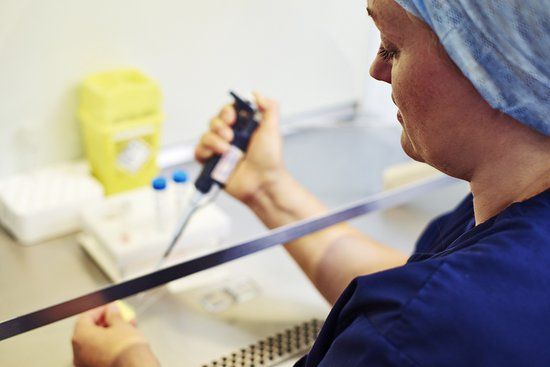
If you’re having trouble getting pregnant, it’s natural to assume you might need IVF.
But how do you know when to seek medical help to get pregnant? When would IVF be recommended, and why?
When to get help
It’s a good idea to get help if you’ve been trying to conceive for a year without success, despite regular intercourse. If you’re an older woman, you should see your GP or book in for a private fertility test sooner, as delaying help could impact on your chances of pregnancy success if you do need IVF.
Fertility testing: Private fertility tests or GP
The first step in helping you to have a baby is to determine exactly why you’re not conceiving. This involves a series of initial fertility tests, which can be carried out by your GP. Or you can book in for a private fertility check at Manchester Fertility, for both you and your partner. Our Fertility MOT tests are an in-depth examination that reveal how fertile both you and your partner are, and whether there are any medical reasons – such as issues with sperm or blocked fallopian tubes – causing your infertility.
Our Fertility MOT testing for men also includes the latest SpermComet DNA Damage test. DNA damage is a common cause of miscarriage or unexplained infertility, but isn’t picked up by conventional sperm analysis methods.
Your test results will determine if you do need fertility treatment, or you just need to try for a baby longer naturally. If you do need IVF, your GP can arrange referral to the local NHS IVF unit, dependent upon whether you meet your local NHS authority criteria for IVF on the NHS. If you are eligible for NHS IVF, you can apply for your NHS IVF treatment to be carried out at Manchester Fertility.
If not, you will need to seek private IVF. If you’re concerned about funding private IVF, we can help through different funding options – find out more about Access Fertility plans including IVF Refund, and our own multi-cycle packages.
Getting started: Private IVF treatment
Your fertility consultant will examine any fertility tests you have had already, or carry out new ones if needed, to determine the most appropriate treatment which may or may not be IVF. All treatment plans are fully and transparently costed, so you know exactly what will happen, and what is included, with no hidden costs.
When IVF is recommended
IVF is one of the most common infertility treatments and it is most often used to overcome problems such as blocked fallopian tubes, where the sperm cannot reach the egg. It might also be recommended if there are minor problems with your partner’s sperm, or if you’re using donor sperm, as IVF with donor sperm is more successful than IUI with donor sperm.
IVF: What happens
IVF involves you undergoing ovarian stimulation to produce mature eggs, which are then fertilised in our laboratory with your partner’s (or a donor’s) sperm. Read our guide to a typical IVF cycle to understand the different stages of treatment.
ICSI and Modified Natural Cycle IVF
In addition to standard IVF treatment, we also offer variations of the technique – Intracytoplasmic Sperm Injection (ICSI) and Modified Natural Cycle IVF.
Modified Natural Cycle IVF uses lower doses of fertility drugs than a standard IVF cycle. Also known as Gentle or Light IVF, stimulation still encourages production of mature eggs. Modified Natural Cycle IVF may be an option if your test results show you have a very low AMH level (less than 5) or are worried about taking fertility drugs. It’s not suitable for everyone; your fertility consultant will fully explain if it’s an option you can consider.
ICSI is used in specific circumstances. It involves the direct injection of a single, healthy sperm directly into the egg to fertilise it in our laboratory, instead of sperm and eggs mixed together in standard IVF. ICSI would be recommended if your fertility problem is caused by sperm disorders – such as poor sperm mobility, abnormal shape, low sperm count and even the presence of antisperm antibodies.
It’s important to remember your actual IVF treatment itself only forms part of your treatment plan at Manchester Fertility.
Together with the combined expertise of our entire team, and our advanced techniques and technologies – including EmbryoScope time-lapse monitoring, EmbryoGlue and SpermComet DNA testing, we ensure you have the best chance of a baby, no matter what your diagnosis.
If you’d like our help to have a baby, it’s easy to get started – call our Patient Advisors on 0161 300 2737 for an informal chat, you can also book in for a no obligation, free one-to-one appointment and tour of our clinic.
Last updated: 12th May 2016








